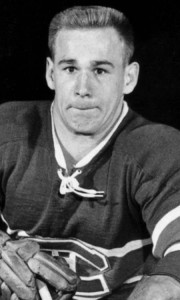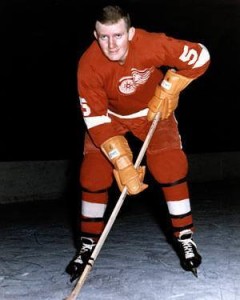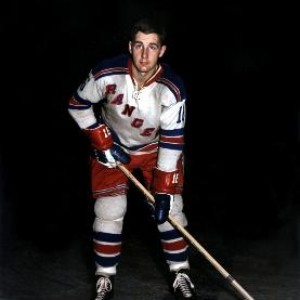The Boston Bruins and New York Rangers, the National Hockey League’s two also-rans, got together yesterday and completed a one-for-one trade of forwards.
The dissension-ridden Bruins dealt away truculent winger Reggie Fleming to the Rangers. In return, the Bruins will get Johnny (Cowboy) McKenzie.
Bruins coach Milt Schmidt summed up his team’s rationale for making the deal:
We traded Fleming’s muscle for McKenzie’s hustle.
Fleming Started in Montreal

Fleming, 29, has had a checkered NHL career, and until last season was known principally as a tough guy. He began his career in the Montreal organization, making his NHL debut with the Habs with three games in the 1959-60 season. That summer he was dealt to Chicago with Ab McDonald for Glen Skov, Terry Gray and the rights to Danny Lewicki, Lorne Ferguson and Bob Bailey.
Fleming spent four seasons in Chicago, earning a reputation as a team policeman. He was mainly on the club to keep other teams honest. In June of 1964 he and McDonald were traded together again, this time to the Bruins for Doug Mohns. In his first season in Boston last year, he blossomed as a scorer, netting 18 goals and adding 23 assists, both career highs. He also played a more disciplined game, but still amassed 136 minutes in penalties.
This season, Fleming seemed to eschew his more controlled game and was guilty of taking many costly and often downright foolish penalties. He has scored only 4 goals and six assists in 34 games. Things came to a head last week when Fleming and team mate Tom Williams were banished from a Bruins practice on the road in Detroit for loafing during the workout. It was clear that Fleming was rapidly wearing out his welcome in Boston.
It’s thought that the Rangers finally decided to pull the trigger on the deal after a meek performance against the Bruins Sunday. Rangers general manager Emile Francis is hoping that Fleming can provide the Blueshirts with some much-needed muscle and backbone.
McKenzie Well-Traveled
McKenzie is 28 and has seen his share of cities in his hockey career. He started his career with the Chicago Black Hawks after a spectacular season with the St. Catharines TeePees of the Ontario Hockey Association Junior A League. McKenzie led the OHA in goals, points and penalty minutes and was rated a sure-fire NHL prospect.
The Black Hawks thought so, too, and he began the 1958-59 season in Chicago. However, after managing only three goals and four assists in 32 games, the off-season rodeo competitor (hence the nickname Cowboy) was shipped, quite appropriately, to the Calgary Stampeders of the Western Hockey League.

The Hawks didn’t protect McKenzie in the June, 1959 draft and he was snapped up by the Detroit Red Wings. McKenzie spent all the 1958-59 season with the Wings, but never really managed to get untracked. He was sent to Hershey of the American Hockey League after 16 games the following season and stayed there until June of 1962. He was traded back to Chicago, along with forward Len Lunde for defenseman Doug Barkley in one of Detroit’s best trades.
McKenzie spent a couple of relatively unproductive seasons with the Hawks, but his hustle and grit caught the eye of Francis and the Rangers picked him up from the Black Hawks last June. He came to the Rangers with forward Ray Cullen for four minor-leaguers.
Francis wasn’t eager to deal the 5-9, 178 pound fireplug, but the Bruins insisted he was the man they wanted for Fleming, so the deal was consummated.
The acquisition of Fleming represents a shift in the Rangers overall team strategy. The team has preached a program of clean, skilled hockey, and Fleming is the antithesis of that. Rangers president William Jennings severely criticized Boston’s Ted Green for the spearing incident involving Ranger Phil Goyette, saying that the Rangers don’t play that style of hockey. Francis explained:

“There’s a difference between good, clean, rough play as permitted by the rules, and dirty play. Green was criticized for his action in spearing Goyette, a talented little player who may be out of the lineup for a long time.”
The Rangers have been looking for a policeman for many years without finding the right man to fill the job. Francis believes Fleming is that man.
Rangers have also announced that defenseman Rod Seiling has been recalled from Minnesota of the Central Professional Hockey League. Forward Jim Johnson, who scored his first NHL goal on the weekend, was sent to Minnesota.
NHL Expansion Meeting Feb 7-9
The National Hockey League’s Board of Governors will meet in New York from February 7-9 to examine and discuss the 13 groups that have officially applied for admission to the league. Twelve American groups and one from Canada have submitted the applications and the accompanying $10,000 fee, which is non-refundable.
NHL president Clarence Campbell hopes that the meeting will give some definition to the expansion program, which until now has been only in the planning stages. The league hopes to add six teams, to be housed in a brand-new division, by the 1967-68 season, or 1968-69 at the very latest.
Campbell says that it is possible that some announcements will be made in New York, but it is unlikely that all six new teams will be identified.
The league’s expansion committee has designated four cities as meeting the NHL’s minimum requirements for a franchise. They are San Francisco-Oakland, Vancouver, Los Angeles and St. Louis. Both San Francisco’s and Vancouver’s applications are contingent on those cities having NHL-calibre rinks ready for the 1967-68 season.
Campbell would not identify individual groups but said that the applicants represent eight cities. Five applicants are from Los Angeles, two from Pittsburgh, and one each from San Francisco, Minneapolis-St. Paul, St. Louis, Baltimore and Buffalo.
The Vancouver application is thought to be made by the owners of the Vancouver Canucks of the Western Hockey League. Broadcaster Foster Hewitt is involved in the syndicate, headed by Vancouver businessman Cyrus McLean.
The Buffalo application comes from a group headed by Ruby Pastor, owner of the Buffalo Bisons of the American Hockey League. Pittsburgh’s ownership group is said to be headed by Senator Jack MacGregor.